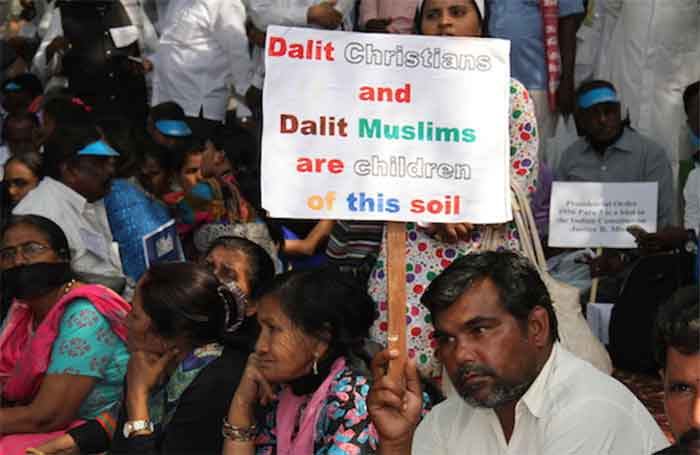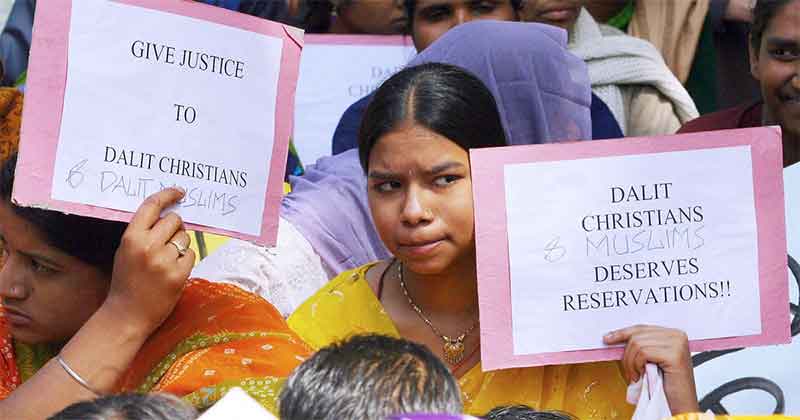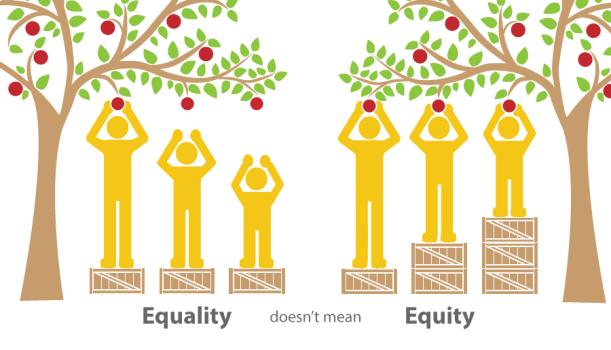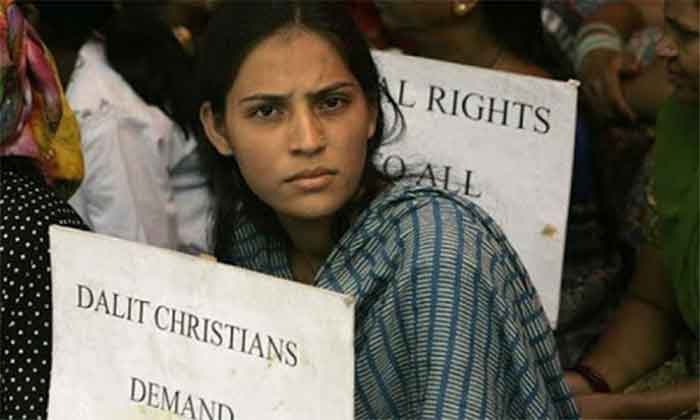
The Supreme Court of India’s Judgment in K.P. Manu v. Chairman, Scrutiny Committee, (2015) 4 SCC 1, para 27 says:
“A Church of South India Commission in 1964 investigating the grievances of Dalit Christians, whether they split off or remain with the Church of South India, wrote:-
First and foremost is the feeling that they are despised, not taken seriously, overlooked, humiliated or simply forgotten. They feel that again and again affairs in the diocese are arranged as if they did not exist. Caste appellations are still occasionally used in Church when they have been abandoned even by Hindus. Backward class desires and claims seem again and again to be put on the waiting list, while projects which they feel aim chiefly at the benefit of the Syrian community seem to get preferential consideration. In appointments, in distribution of charity, in pastoral care and in the attitude shown to them, in disputes with the authorities, the treatment they receive, when compared with that received by their Syrian brothers, suggests a lack of sympathy, courtesy and respect.”
Resources for, “The week of prayer for Christian unity and throughout the year 2013.” What does God require of us? (cf. Micah 6:6-8).
Jointly prepared and published by the Pontifical Council for Promoting Christian Unity, Holy See (Vatican) & the Commission on Faith and Order of the World Council of Churches.
To those organizing the week of prayer for Christian Unity.
“The Dalits in the Indian context are the communities which are considered ‘out-castes’. They are the people worst affected by the caste-system, which is a rigid form of social stratification based on notions of ritual purity and pollution. Under the caste-system, the castes are considered to be ‘higher’ or ‘lower’. The Dalit communities are considered to be the most polluted and polluting and thus placed outside the caste-system and were previously even called ‘untouchable’.
Because of Casteism, the Dalits are socially marginalized, politically under-represented, economically exploited and culturally subjugated. Almost 80% of Indian Christians have a Dalit background.”
As per the above said declaration of the mainline Churches, among the Christians of India, majority of the people are from the Christians of Scheduled Castes Origin/ Dalit Christian community background and these people are affected by the traditional practice of Castes discrimination/ untouchability which is prevailing in the society. Though these people’s Castes names like Parayar, Pallar, Arunthathiyar, Vannan, Mala, Madiga, Pulayar, Adi Dravidar, Bangi, Balmigi, Jatav, Chammar, Pano, Mahar, Mangs and so on are there in the Schedule Castes list, Dalit Christians are not entitled to avail the Scheduled Castes status because of the religious ban of the Constitution Scheduled Castes Order 1950, paragraph No. 3.
So, these people do not have the right to contest in the reserve constituencies, to be elected as members to Indian Parliament’s lower House as per Article 330, all the State legislative Assemblies as per Article 332, local Village Administrative bodies/ Panchayats under Article 243D and the Municipal Urban Administrative bodies under Article 243T.
Dalit Christians’ active participation as registered members in all the political parties are very high and their active involvement in casting their Votes/ franchise as Voters during elections are more when comparing to other non- Dalit Christian communities, but/ because of their low Caste identity and their penury related poorest economic plight, these people are not given chances to contest in the general Constituencies by most of the national and the regional political parties. As per the following Constitutional mandate, the representation of the people act, 1951, in abnormal percentage, the Dalit Christians are playing pivotal role in all the functions/ activities of most of the political parties.
Section 29A says as follows, “Registration with the Election Commission of associations and bodies as political parties. (1) Any association or body of individual citizens of India calling itself a political party and intending to avail itself of the provisions of this Part shall make an application to the Election Commission for its registration as a political party for the purposes of this Act.”
Majority of the political parties usually get these Voters’ support by telling the fear of religious persecution and religious aggression against the religious minorities. In the case of endorsing/ accepting the recommendation of Justice Ranganath Misra Commission Report/ National Commission for Religious and Linguistic Minority Report, from the Year 2005 up to 2024, for the extension of Scheduled Castes status to Dalit Christians, majority of the political parties including the ruling and the opposition parties did not take supportive measures.
In the selection process of members for National Minority Commission, State Minority Commissions, various Welfare Commissions of the federal Government and the States, mostly the non- Dalit Christians are identified/ recommended by the political parties directly and by some of the main line Churches indirectly. In the same manner, only non- Dalit Christian leaders are identified, motivated and supported as political leaders by some of the mainline Churches because of the Caste mind- set and prejudice linked Castes hegemony.
Most of the political parties and its leaders are also identifying and picking mainly the non- Dalit Christians as candidates to contest in the general constituencies for becoming members of the village administrative set up both, rural and municipal areas, Legislative Assemblies of States, lower house of the Indian Parliament. These Dalit Christian Villagers are only facing the religious persecution linked with the Castes discrimination in the rural area like Khandamal of Odisha where hundreds of people shed their blood and died as martyrs for their faith and for the religious freedom under Article 25.
In the name of faith, even in the prosperity gospel preaching evangelical field also, majority of the independent evangelists and preachers who swindle the economy of the impoverished poorest Christians are mostly from some of the non- Dalit Christian communities, there are very negligible numbers of the prosperity gospel preaching evangelists and preachers serve from the Dalit Christian background.
Most of the independent Churches, some of the mainline Churches and most of the visible Christian leaders and the whole Indian Christian community do not take any practical oriented initiation/ steps to eradicate the caste discrimination related untouchability practice among the Christians as per the Indian Constitution Article 17, their religious Canon law and the Christians ethics and values like, “love thy neighbor as thyself.”
In Tamil Nadu, in the name of Christian Welfare movement for protecting Christianity, many non- Dalit Christian political leaders had started movements with the support of some of the main line Churches, simultaneously by using the influence of the Churches and by having majority of the Dalit Christians, mere as ordinary members of their Organizations without allowing them to become leaders and also simultaneously having membership in major political parties as functionaries, many non- Dalit Christians have become Members of Legislative Assembly and members of various State Government’s Commissions like State Minority Commission and so on. The basic thing is that these/ some of the non- Dalit Christian leaders reveal to the political leaders, the hypothetical and imaginary picture that the entire Churches are in solidarity with them. Through the Churches, in the name of saving the Christians from the religious persecutions, some of the non- Dalit Christians would be easily picked up as political rulers.
Let the political leaders, Church leaders, non- Dalit Christian leaders, Indian Christians and the civil society think about the reality and do justice to the needy impoverished Christians of Scheduled Castes Origin/ Dalit Christians of India to be elevated in the political fields as per the above edified reality. The Dalit Christians are following the Christian religion, because of that, they lose the Scheduled Caste status, welfare measures and affirmative actions, in this critical condition, by considering the sacrifice of the Dalit Christian community, the entire Christian society should serve for their upliftment, emancipation and amelioration in the Christian society and in the civil society.
The International Christian community and the Churches had motivated and brought many African- American community leaders/ Stalwarts including the political leaders like Martin Luther King Jr, Nelson Mandela, Desmond Tutu, Kofi Annan, Barack Obama and so on, but in India, the Church and the Indian Christian community had never motivated and brought a Dalit Christian political and community leader, it is unfortunate on the part of the entire International and the Indian Christian community.
Franklin Caesar Thomas, Advocate and one of the founders of the National Council of Dalit Christians (NCDC). This Article is written in the individual capacity of the author, this article does not have any view/ link with his profession and with his participation as member of any Organization.















































